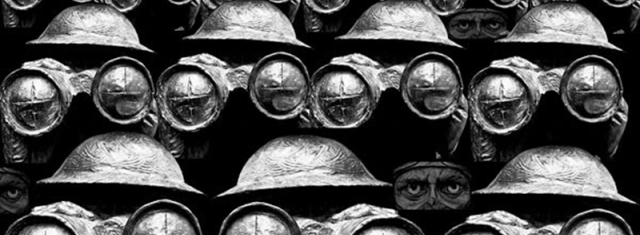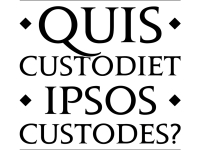News
Human Rights NGOs: "Quis custodiet ipsos custodes?"
By Elliott Abrams | CFR

Who's Watching The Watchers? (Source: Copyright © ALAN ABERCROMBIE)
"These are subjects I discussed recently in a short paper done for the Council on Foreign Relations’ Diamonstein-Spielvogel Project on the Future of Democracy. It is entitled Human Rights NGOs: "Quis custodiet ipsos custodes?". The paper pays special attention to the two largest human rights NGOs (by far), Human Rights Watch (HRW) and Amnesty International.
An example of the bias that can be found in the field is presented by the Palestinian journalist Khaled Abu Toameh and called “Palestinians: The House Demolitions and Land-Grabs No One Talks About.”
PRESSURE POINTS
Abrams gives his take on U.S. foreign policy, with special focus on the Middle East and democracy and human rights issues.
Abu Toameh is writing about human rights violations against Bedouins—the sort of thing that arouses widespread criticism when the allegations are against Israel, and has for years. In 2008, Human Rights Watch did a 130-page report on this subject, calling on Israel to end all home demolitions. A cursory Google search shows repeated Amnesty and HRW reports on the subject.
An example of the bias that can be found in the field is presented by the Palestinian journalist Khaled Abu Toameh and called “Palestinians: The House Demolitions and Land-Grabs No One Talks About.”
PRESSURE POINTS
Abrams gives his take on U.S. foreign policy, with special focus on the Middle East and democracy and human rights issues.
Abu Toameh is writing about human rights violations against Bedouins—the sort of thing that arouses widespread criticism when the allegations are against Israel, and has for years. In 2008, Human Rights Watch did a 130-page report on this subject, calling on Israel to end all home demolitions. A cursory Google search shows repeated Amnesty and HRW reports on the subject.
Here are Abu Toameh’s opening paragraphs:
While the international community and media continue to condemn Israel day in and day out about a host of grievances, including the demolition of houses built without proper permits, no one seems to be interested in the ongoing human rights violations against Palestinians by the Palestinian Islamist group Hamas.
The United Nations and many foreign journalists are so obsessed with Israel that they have paid no attention to the latest crime committed by Hamas against residents of the Bedouin village of Umm al-Nasr in the northern Gaza Strip. The village was established nearly 80 years ago, long before Hamas was founded in 1988.
On June 9, hundreds of Hamas security officers raided the village to destroy several houses, as part of the terror group's attempt to evict the residents from the area. Hamas claims that the village was illegally built on "state-owned" land.
While the international community and media continue to condemn Israel day in and day out about a host of grievances, including the demolition of houses built without proper permits, no one seems to be interested in the ongoing human rights violations against Palestinians by the Palestinian Islamist group Hamas.
The United Nations and many foreign journalists are so obsessed with Israel that they have paid no attention to the latest crime committed by Hamas against residents of the Bedouin village of Umm al-Nasr in the northern Gaza Strip. The village was established nearly 80 years ago, long before Hamas was founded in 1988.
On June 9, hundreds of Hamas security officers raided the village to destroy several houses, as part of the terror group's attempt to evict the residents from the area. Hamas claims that the village was illegally built on "state-owned" land.
Abu Toameh’s story is a good reminder of the problems about which I was writing in Human Rights NGOs: "Quis custodiet ipsos custodes?” The disproportional attention HRW and Amnesty pay to Israel, and the double standards they apply, are worthy of serious concern and of fair and independent examination. So are the wider issues about the governance and impact of the largest international human rights NGOs, as I discussed in my short paper on them.
This article was republished under a Creative Commons License.
Attribution-NonCommercial-NoDerivatives 4.0 International (CC BY-NC-ND 4.0)
https://creativecommons.org/licenses/by-nc-nd/4.0/
Source: Council on Foreign Relations| Blog post by Elliot Abrams
https://www.cfr.org/blog/human-rights-ngos-quis-custodiet-ipsos-custodes
_____________________________________________________________
Office of Strategic Communications & Analysis
ARAC International, Global Security Analyst | Human Rights Consultant
Certified by the U.S. Institute for Diplomacy and Human Rights
Institute for Economics and Peace Ambassador
https://iep.arac-international.org
This article was republished under a Creative Commons License.
Attribution-NonCommercial-NoDerivatives 4.0 International (CC BY-NC-ND 4.0)
https://creativecommons.org/licenses/by-nc-nd/4.0/
Source: Council on Foreign Relations| Blog post by Elliot Abrams
https://www.cfr.org/blog/human-rights-ngos-quis-custodiet-ipsos-custodes
_____________________________________________________________
Office of Strategic Communications & Analysis
ARAC International, Global Security Analyst | Human Rights Consultant
Certified by the U.S. Institute for Diplomacy and Human Rights
Institute for Economics and Peace Ambassador
https://iep.arac-international.org
more information: https://www.arac-international.org/2022/08/council-on-foreign-relations-human.html
Liability for this article lies with the author, who also holds the copyright. Editorial content from USPA may be quoted on other websites as long as the quote comprises no more than 5% of the entire text, is marked as such and the source is named (via hyperlink).






